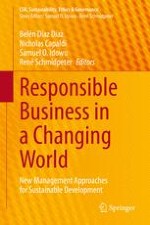This book explores the current state of Corporate Social Responsibility (CSR) from an international perspective, the goal being to share ideas and visions for a sustainable future and to provide useful guidelines for academics, practitioners and policymakers in the context of the 2030 “Agenda for Sustainable Development” released by the United Nations. Research on CSR has evolved considerably over the last three decades. However, there are still many unanswered questions concerning the sustainability of business in an increasingly changing world, for example: If most companies consider CSR to be valuable to their organizations, why do only 15% of them systematically implement Social Responsibility initiatives? If CSR has been found to be profitable for companies, why are they so reluctant to develop an active, internal CSR policy? Why are there such significant differences in CSR adoption from country to country? Why does it take a huge crisis to make politicians react and regulate certain core CSR issues? This contributed volume answers these questions, presenting a wealth of case studies and new approaches in the process.
